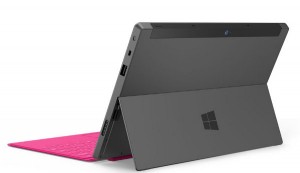Microsoft Surface is all style and no substance at all
 Microsoft’s Hollywood announcement Monday of its two Surface tablet computers was a tactical triumph but had no strategic value for the world’s largest software company because the event left too many questions unanswered. If I were to guess what was on Microsoft CEO Steve Ballmer’s mind it was simply to beat next week’s expected announcement of a Google branded tablet running Android. Microsoft, already playing catch-up to Apple’s iPad, does not want to be seen as following Google, too. So they held an event that was all style and no substance at all.
Microsoft’s Hollywood announcement Monday of its two Surface tablet computers was a tactical triumph but had no strategic value for the world’s largest software company because the event left too many questions unanswered. If I were to guess what was on Microsoft CEO Steve Ballmer’s mind it was simply to beat next week’s expected announcement of a Google branded tablet running Android. Microsoft, already playing catch-up to Apple’s iPad, does not want to be seen as following Google, too. So they held an event that was all style and no substance at all.
This is not to say that Microsoft shouldn’t make a tablet and couldn’t make a good one, but this particular event proved almost nothing.
Microsoft announced two tablets but only one was shown. No prices and few specs were announced. The clever keyboard cover mentioned in all stories (including this one) wasn’t functional. No reporters thought to count the ports on the sides of the one tablet available for use and they couldn’t look at their pictures to count them later because they weren’t allowed to take any that showed the sides.
What Microsoft did was play well the mystery card, copying Apple, though I’m not sure how well that will work the next time. To their credit, though, when Google’s tablet is covered here and everywhere next week you can bet the Surface line will get nearly as much comparative play as Apple’s iPad.
Now you See It, Now You Don't
With that out of the way let’s consider what are Microsoft’s expectations for a tablet, which are more diverse than one might expect.
Several stories pointed out that building a Microsoft branded tablet might alienate Redmond’s long list of hardware OEMs. While this is true, I’d suggest you look at it another way. I have over the last 25+ years attended dozens of high-profile Microsoft events for products that never made it to market. Knowing that, my first instinct said this was a Microsoft threat more than anything else.
Look back to Microsoft’s many antitrust defenses and you’ll see they threatened just about every OEM at some point. Bullying is in Microsoft’s DNA. Their legal defense was that they never intended to follow through which, by the way, didn’t work with the judges, either.
So does Microsoft really intend to introduce these tablets? Probably. Could something happen to change that determination? Sure.
One really good reason for announcing such vaporous products under the Microsoft brand is that novelty has dissuaded many commentators from questioning the whole enterprise. Microsoft is being given the benefit of the doubt based on what, a kickstand?
It's About Exchange
So here’s what I’ve been able to figure out about the two Surface machines and where they might be positioned. For one, the ARM-based unit had an nVIDIA Tegra2 processor like most of the Android tablets. The Win8 unit will use an Intel Atom.
It’s puzzling to think how Microsoft will position these tablets. But having scratched my head a lot I’ve decided their story will be that these are the corporate tablets. They’ll run Exchange really, really well, come packed already with Office, and if your IT department is comfortable with Windows, well they’ll be comfortable with these tablets, too.
It’s weak, I know, but that’s the best I could come up with, folks. Sorry.
Microsoft can’t claim these tablets are better than the iPad, and I didn’t see a word to that effect in any of the stories (I wasn’t invited to the L.A. event). They might try to compete on price, but they don’t seem to be doing that either. Nor can they, really, since Apple makes its own CPUs and Microsoft doesn’t. How can Microsoft undercut Apple on price? Maybe by thinning margins, but these tablets aren’t going to leave Redmond with a $100 bill taped to the bottom. Those days are over.
Windows is always playing catch-up to OS X just as these tablets are to the iPads. While we’ll see instances of design brilliance, like that kickstand, not even Microsoft expects their product to be in any way broadly superior to the iPad.
So Microsoft is vying here for second place and the comparison that really counts is with next week’s Google tablet, not the iPad.
Reprinted with permission
 Robert X. Cringely has worked in and around the PC business for more than 30 years. His work has appeared in The New York Times, Newsweek, Forbes, Upside, Success, Worth, and many other magazines and newspapers. Most recently, Cringely was the host and writer of the Maryland Public Television documentary "The Tranformation Age: Surviving a Technology Revolution with Robert X. Cringely".
Robert X. Cringely has worked in and around the PC business for more than 30 years. His work has appeared in The New York Times, Newsweek, Forbes, Upside, Success, Worth, and many other magazines and newspapers. Most recently, Cringely was the host and writer of the Maryland Public Television documentary "The Tranformation Age: Surviving a Technology Revolution with Robert X. Cringely".
